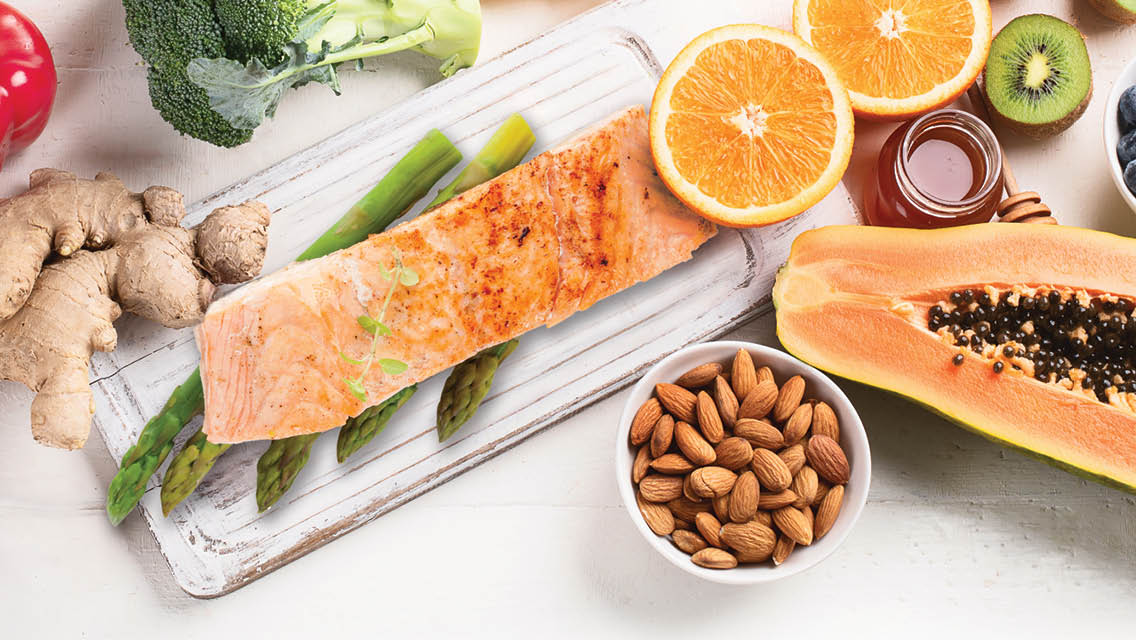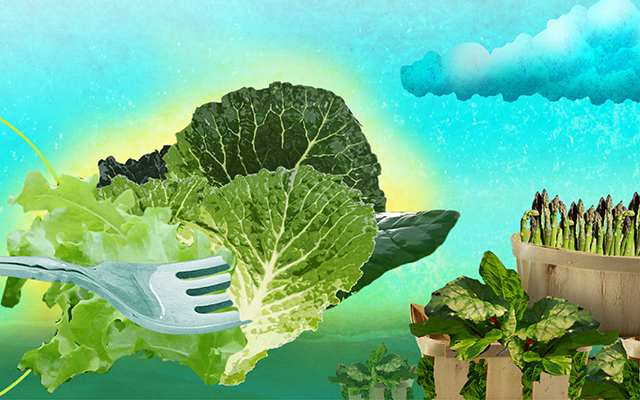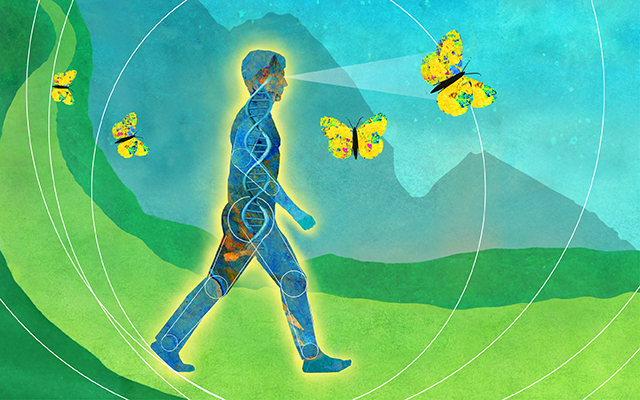Contents of this article:
- Fend Off Fatigue
- Tempt Numbed Taste Buds
- Protect and Fortify a Weakened Immune System
- Reduce Inflammation and Nausea
- Cancer and Sugar
Ten years ago, cancer treatment rocked my relationship with food. My tongue developed road rash. My taste buds went on strike. Food’s small daily pleasures evaporated, seemingly overnight. Even tap water tasted noxious, like I was licking the world’s oldest water fountain.
As my treatment wore on, my muscles atrophied and my energy sputtered. When I asked the cancer center’s dietitian for advice, she waved off my questions and told me to pick up some Ensure on my way home.
Since then, I’ve met dozens of current and former cancer patients with similar stories of providers who told them to “eat whatever looks good” and “it really doesn’t matter.”
Yet food clearly does matter to cancer patients. Studies show that roughly half modify their diets in hopes of improving their survival odds. And as many as 80 percent of patients become malnourished during treatment. This can lead to fatigue, delayed wound healing, and even increased risk of death.
This is not a small problem: One in three American adults will be diagnosed with cancer during their lifetimes. So why is it so difficult to get good advice on eating to support your body during cancer treatment?
Donald Abrams, MD, an integrative oncologist at the University of California San Francisco, says it’s because most doctors — especially oncologists — aren’t trained in nutrition. “Oncology is the most evidence-based of all of the medical subspecialties,” he explains. “We like to see P values and randomized placebo-controlled trials, and you can’t do that with broccoli and blueberries.”
Still, in the past five years scientists have begun to better understand the impact food can make on the success of cancer treatment, says Naama Kanarek, PhD, a professor at Harvard Medical School who studies the impact of diet on cancer metabolism. Approaches are starting to shift.
“I am not saying diet can replace treatment — we should fight cancer with everything we have. But I am saying that there is a connection between what we eat and the success of cancer treatment,” Kanarek says.
That connection has long felt intuitive to Abrams, whose interest in nutrition and health led him to integrative oncology decades ago. He sees cancer as a weed in the garden that is the body. “My job is to make the soil as inhospitable as possible to the growth and spread of the weed. The patient’s job is to fertilize the garden with plant-based, antioxidant-rich, anti-inflammatory whole foods.”
If you or someone you love is undergoing cancer treatment, don’t be discouraged by providers who say diet doesn’t matter. Science shows that foods, herbs, and spices are some of the best tools we have — not only to blunt the side effects of cancer treatment, but also to control the growth of cancer itself.
Let’s talk about the ways food can help alleviate some of the common side effects of cancer treatments and boost the body’s own immunity.
Fend Off Fatigue
Most cancer patients experience fatigue during treatment, and for some, the weariness is debilitating. Experts say the best way to keep energy levels up is to eat plenty of quality protein.
Protein is vital because it preserves muscle mass, which means less fatigue. A 2015 study of patients undergoing chemotherapy found that skimping on protein was a stronger contributor to fatigue than nausea, vomiting, insomnia, or age.
“Protein is a major player for strength,” says Rebecca Katz, MS, author of The Cancer-Fighting Kitchen: Nourishing, Big-Flavor Recipes for Cancer Treatment and Recovery. “Chemotherapy is the equivalent of demo-ing your entire house to renovate the guest bathroom. You’ve got to give your body tools to rebuild.”
“Protein is the first thing I address with people, because the body can’t repair and recover without it.”
Treatment can make eating difficult, and protein deficiency is common among cancer patients, explains Dionne Detraz, RDN, author of The Cancer Diet Cookbook: Comforting Recipes for Treatment and Recovery. “Protein is the first thing I address with people, because the body can’t repair and recover without it.”
During treatment, one of the best protein sources is coldwater fatty fish, such as salmon, sardines, trout, and mackerel, Detraz says. A raft of studies show that omega-3 fatty acids, especially EPA (eicosapentaenoic acid), cool inflammation, slow muscle loss, and inhibit tumor growth.
Bone broth is another easy, nourishing protein source, and it’s handy if lack of appetite is an issue. This is one of Detraz’s go-tos because it also delivers hydration, electrolytes, and glutamine, which is essential for rebuilding muscle tissue. It also helps the digestive system repair damage inflicted by chemotherapy. She recommends making bone broth at home or asking a loved one to make it for you. The next-best option is to buy it fresh or get the highest-quality packaged version you can afford.
For vegetarians, plant-based proteins are great, including beans, nuts, seeds, and tofu. But keep digestibility top of mind: Cancer treatment can roughen up the gastrointestinal tract.
“Animal protein is the easiest source of amino acids for the body to assimilate,” says Detraz. If a person wants to return to being vegetarian or vegan later, that’s great, she says, but easily digested protein is the priority during treatment.
Tempt Numbed Taste Buds
Cancer treatment often alters how foods and drinks taste: As many as 84 percent of patients say they experience issues with palate changes. Researchers don’t fully understand why this happens, but a lack of interest in eating can lead to fatigue, involuntary weight loss, and muscle wasting.
“If food doesn’t taste good, it doesn’t matter how healthy it is, because no one is going to want to eat it,” explains Katz. “You’ve got to entice the taste buds that aren’t numbed out from treatment.”
Katz encourages people undergoing treatment to keep a “flavor kit” of salt, citrus, olive oil, and maple syrup at hand for tweaking dishes that don’t hit the right note. “Think of it as a game of darts, with the bull’s-eye being that absolute moment of yum.” She recommends the following tactics:
- Try a pinch of salt. Katz compares salt to scrubbing bubbles “because it goes inside the taste bud and sparks salivation.”
- Squeeze a few drops of lemon on top if the food still tastes bland, or if it was too salty from the start. Go slow so as not to overwhelm the dish, says Katz. “A little acid animates the flavor, makes it brighter.” Lemon can also help neutralize chemotherapy’s metallic aftertaste. And if it’s your water that tastes like metal, she recommends putting a bunch of lemon slices into a pitcher of water and keeping it in the fridge. “Mint and berries also work,” she says.
- Drizzle on a little maple syrup if a dish is too acidic. “I call it ‘my drape of mape,’” she says. “Many cancer patients are avoiding sugar, but just a quarter of a teaspoon of maple syrup can balance the flavor of an entire pot of soup, so it’s worth it.” Like lemon, maple syrup can cut through the metallic taste caused by chemotherapy.
- Add a fat if the dish is still blah. Extra-virgin olive oil works for many foods, but you can also try coconut milk, cashew cream, or nut butter. “Fat spreads flavors across the taste buds,” Katz says. If you have trouble swallowing or have mouth sores, she advises adding a bit of fat and staying away from ginger, curry, red-pepper flakes, and other strong spices.
Protect and Fortify a Weakened Immune System
Most cancer therapies deplete the immune system, so take a two-pronged approach — protect and fortify. Your immune strength will likely fluctuate: Different types of treatment (radiation versus bone-marrow transplant, for example) and where you are on the treatment trajectory (in the first few weeks or the final ones) will affect how depleted you may feel.
When your blood is tested before an infusion, Christine Zoumas, MSN, director of the Healing Foods Program at the Moores Cancer Center at University of California San Diego Health, recommends asking your provider, “How immunocompromised am I?” If the answer is “very,” Zoumas suggests the following food-safety precautions:
- Avoid unpasteurized juices and dairy.
- Don’t eat raw or undercooked eggs — and watch out for eggs in cookie dough and salad dressings.
- Skip raw sprouts.
- Heat all leftovers to at least 165 degrees F. Invest in a food thermometer if needed.
For fortification, prioritize foods that are rich in phytonutrient polyphenols, including berries, citrus fruits, green tea, leafy greens, garlic, and onions. When in doubt, says Detraz, choose colorful produce like red bell peppers, blueberries, and beets. “More and more research shows that the color pigments in plants help the body turn off cancer cells and turn on immune cells.”
And don’t forget fungi. Mushrooms are a rich source of beta-glucans, a soluble fiber that nourishes the gut lining. Research also suggests that beta-glucans can modulate the immune system and curb tumor growth.
Reduce Inflammation and Nausea
Given the challenged state of many people’s food tolerance, it may seem counterintuitive to dial up herbs and spices during treatment. Yet a growing body of evidence suggests these foods are powerful allies: Turmeric is an anti-inflammatory; cinnamon is an antioxidant and helps to balance blood sugar; and peppermint reduces nausea and relieves indigestion.
“Gram for gram, nothing packs more power than herbs and spices,” says Katz. “For the teeniest bit, you get so much bang for your buck.”
Katz uses herbs and spices in combinations of three to get the best flavor. For instance, she combines lemongrass, ginger, and mint for Thai specialties; turmeric, cumin, and cardamom for Indian dishes; and chilies, oregano, and cilantro for Mexican foods.
“Spices are the melody — the little things that we don’t think about that can make a huge difference in the taste of a dish,” she says.
If there’s a single herb that most embodies healing potential for cancer patients, it’s ginger. For centuries and across healing traditions, it has been used as a remedy for afflictions that plague cancer patients, such as nausea and lack of appetite. Research shows that ginger soothes inflammation and can incite hunger by sparking gastric secretions. (Note that some people find ginger so stimulating that it actually triggers digestive upset, so experiment to see if it’s right for you.)
To ignite fickle appetites, Katz likes to reduce ginger to a syrup; patients can take a teaspoon of this before meals. (Just simmer chopped gingerroot in a little water and add a bit of honey to taste.) If you tolerate ginger well, a cup of ginger tea or a bite of candied ginger may also help stimulate appetite.
Finally, remember that if food doesn’t taste good, it doesn’t matter how healthy it is. “Taste and texture are key components to feeling nourished,” Katz says. “All of those things that go into giving you that involuntary Mmmm are the very things that can help your body heal.” (Try this anti-inflammatory Ginger-Lemon Wellness Shot.)
Cancer and Sugar
While the top priority during treatment is to keep eating — you need to avoid excessive weight loss and muscle wasting — there are benefits to proceeding with a minimal reliance on sweets.
“In my mind, sugar is the No. 1 no-go,” says Donald Abrams, MD, integrative oncologist at the University of California San Francisco. “Too much sugar can lead to systemic inflammation and cancer growth.”
The connection comes down to insulin, which balances glucose levels in the blood. When glucose moves from the gastrointestinal tract to the bloodstream, insulin signals to the cells that glucose is available.
Cells take this signal as a positive cue to grow, explains Naama Kanarek, PhD, a professor at Harvard Medical School who studies cancer metabolism. “If a normal cell gets insulin’s signal that glucose is available, it acts like a normal cell, takes up a little glucose, and uses it.”
The problem is that cancer cells also respond to insulin’s call. “If a tumor cell gets that same cue,” she says, “the signal is translated into growth because that is what they do. Every cell has a function. Tumor cells proliferate — that is their function.” To reduce cancer cells’ growth, drugs were developed to directly inhibit this growth signal, and cutting back on sugar can help these drugs to discourage proliferation in tumor cells.
That said, you don’t want to overthink this — and an all-or-nothing approach is counterproductive, says Rebecca Katz, MS. “Nutritional analysis leads to culinary paralysis. [People] put themselves into flight-or-fight mode every time they think about food.”
“Food [as medicine] can be empowering,” she explains, “but when we start to get dogmatic it becomes a constraint instead of an expansion.” If you want to curb a sweet tooth, try swapping out refined-sugar treats for those sweetened by dates, maple syrup, or coconut.
Finally, she suggests that if you find yourself with homemade treats from friends and family from time to time, just enjoy them. They’re not poison.
“Don’t demonize any one food or nutrient,” she says. “Food can play a supportive role if you let it.”





This Post Has 0 Comments